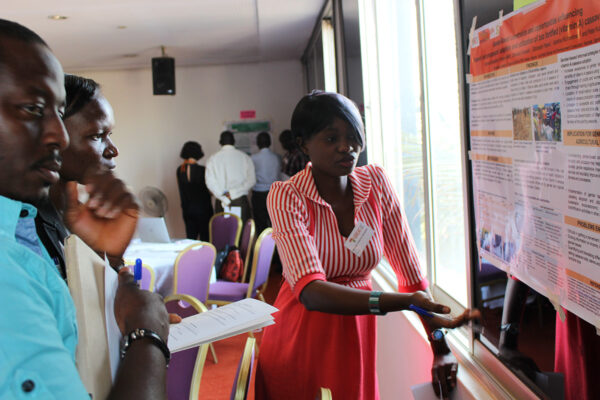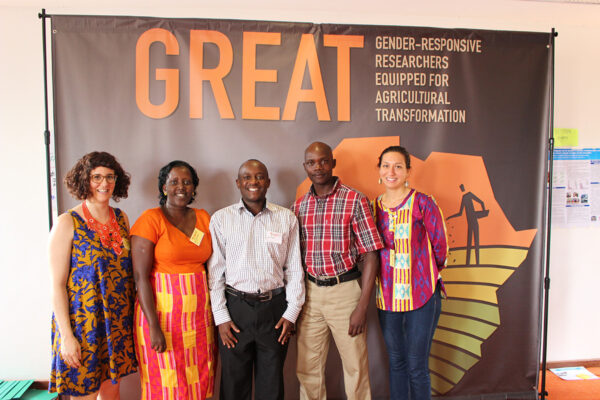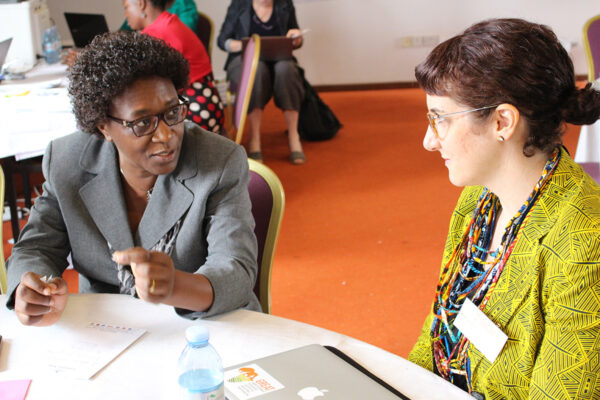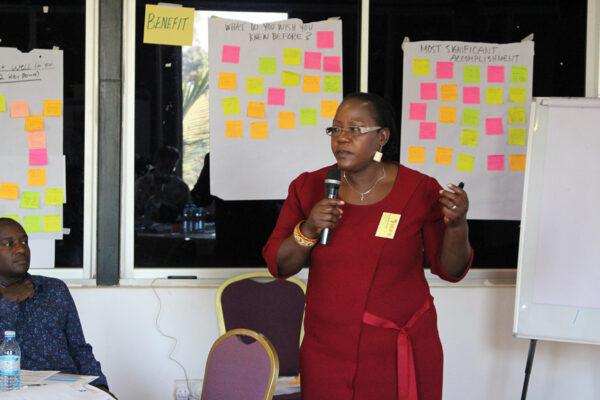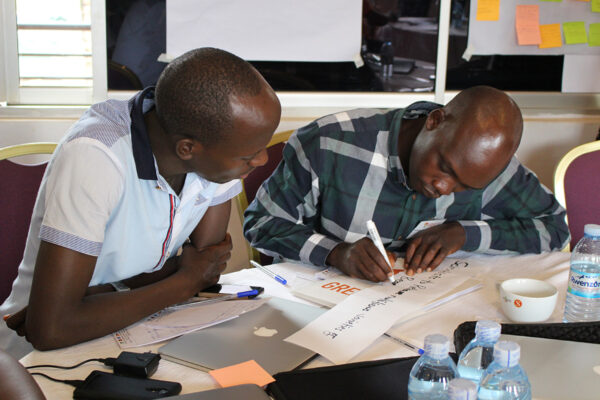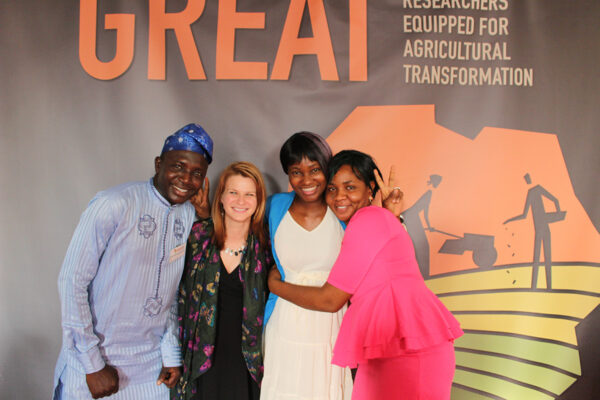Gender-Responsive Roots, Tubers, Banana Breeding Course
GREAT delivers courses to agricultural researchers from sub-Saharan Africa in the theory and practice of gender-responsive research, seeking to increase opportunities for equitable participation and the sharing of benefits from agricultural research and improve the outcomes for smallholder women farmers, entrepreneurs, and farmer organizations. By building and engaging communities of researchers equipped with the skills, knowledge, and support systems to develop and implement gender-responsive projects, GREAT advances gender-responsiveness as the norm and standard for agricultural research.
The first GREAT course, Gender-responsive Roots, Tubers and Banana Breeding, took place in Kampala, Uganda, over two weeks in September 2016 and February 2017, with mentor-supported field work in between.
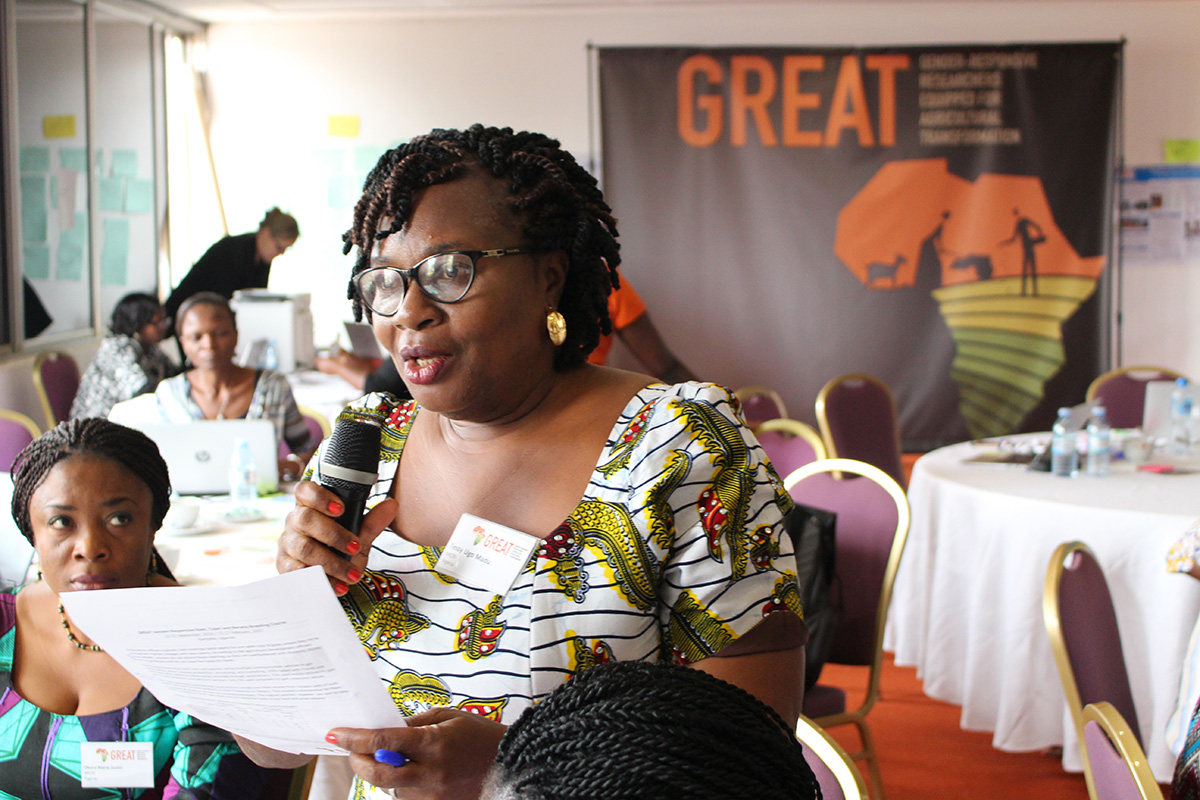
Course Objectives
The course is divided into two parts. Part 1 (face-to-face) targets both biophysical and social scientists, while Part 2 (virtual) targets only social scientists (and is optional for biophysical scientists).
The GREAT Gender-Responsive Plant breeding Course aims to achieve the following objectives:
Part One
- Increased ability to articulate the concepts and principles of gender-responsive breeding and seed systems
- Enhanced knowledge of how to incorporate gender responsiveness in plant breeding and seed systems
- Demonstrated positive attitude and appreciation of the value of GRAR
- Strengthened ability to conceptualize, design and conduct GRAR
- Enhanced ability to communicate and advocate for gender-responsive agricultural research to a range of audiences within plant breeding and seed systems
- Strengthened commitment, and ability to champion GRAR in agricultural research institutions
Part Two
- Increased ability to collect, analyze, interpret and integrate intersectional qualitative and quantitative social data with a focus on plant breeding and seed systems
- Enhanced knowledge on how to design a theory of change and track agricultural research programs towards gender-equitable outcomes
DESIGNED BY
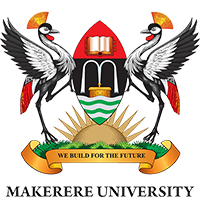

COURSE PARTICIPANTS
Banana Bunchy Top Disease (BBTD) containment and recovery; building capacity and piloting field recovery approaches through a learning alliance.
This project focuses on containing Banana Bunchy Top Disease (BBTD) through: piloting community and farm household recovery strategies, informed by gender role and household typology understanding, in BBTD-affected areas; testing alternative approaches to develop supply chains for virus-free planting material; and building knowledge and predictive tools of virus-vector-host interactions, cropping system and farmer management.
Donor Agency: CGIAR-RTB
Mentor: Brenda Boonabaana
Development Food Assistance Program for Burundi (DFAP), entitled “Amashiga.”
Banana Xanthomonas Wilt (BXW) is a serious problem of banana production in Burundi. While conventional control can be effective, it is extremely labor intensive, results in the certain loss of all or part of the banana harvest, and farmers have demonstrated significant resistance to adoption. After showing potential in field trials using a new approach called Single Diseased Stem Removal (SDSR), Bioversity scientists established self-help groups in the Democratic Republic of the Congo (DRC) aimed at understanding social dynamics around adopting the technology and participatory learning for fine tuning the control strategy. Preliminary results show that SDSR can rapidly reduce the number of infected plants with little effort, however, the pilot revealed potential gender challenges. Building on this work, gendered and socially differentiated research is needed to better understand the effectiveness of SDSR, and to assess how gender dynamics around decision-making, resource allocation and gendered cropping practices could impact the successful scaling of SDSR.
Donor Agency: USAID/Food for Peace (FFP)
Mentor: Renée Bullock
Driving livelihood improvements through demand oriented interventions for competitive production and processing of cassava.
This project addresses opportunities related to improving efficiency and gender equity issues of cassava processing, and the resulting demand for sustainable intensification of cassava production systems. The research will also exploit opportunities for increasing farmer income through use of byproducts of RTB production and processing waste for livestock feeding. Impact, especially benefitting women, will result from integrated improvements along the value chain: greater resource use efficiency and reduced pollution with processing into primary product; value-added utilization of by-products of production and waste from processing; and improved productivity, sustainability and profitability of smallholder cropping systems. This project creates the opportunity for researchers and stakeholders on three continents to work more closely together to expand the worldwide network of collaboration on post-harvest processing of RTBs for South-South learning.
Donor Agency: CRP-RTB
Mentor: Lora Forsythe
Establishment of pilot sites for the strengthening of local seed systems and the validation of strategies for eradication and replanting of banana plantations infected by Banana Bunchy Top Virus (BBTV).
This project addresses Banana Bunchy Top Disease (BBTD) caused by Banana Bunchy Top Virus (BBTV) through: testing and validation of Musa seed systems in BBTV affected farms; development of farmers’ knowledge based on symptoms and practices aimed at BBTD management; improved understanding of host-vector-virus relationships/epidemiology of the disease and awareness raising of different stakeholders/involving government support. Gender aspects are incorporated while organizing meetings in order to involve all categories of stakeholders in banana bunchy top disease management.
Donor Agency: BIOVERSITY International
Mentor: Anne Rietveld
Improvement of banana for smallholder farmers in the Great Lakes region of Africa.
This project aims to improve banana production through: enhancing the performance of banana breeding systems in East and Central Africa; using pathogen identification and accelerated early stage resistance screening to enhance resistance to pests and diseases; improving breeding efficiency through molecular-based genetic studies and development of DNA marker-based early selection; enhancing breeding and adoption through end-user feedback systems and participatory evaluation; and developing an open-source database and tool box for breeders and researchers to improve efficiency and synergy.
Donor Agency: Donor Agency: The Bill and Melinda Gates Foundation, through the International Institute for Tropical Agriculture (IITA)
Mentor: Sarah Mayanja
Increasing the quality and quantity of potato production in south western agro ecological zone.
Women contribute about 90 percent of labor activities involved in potato production in Uganda, yet they benefit less from their efforts than their male counterparts. This project, funded by the Government of Uganda and implemented by KaZARDI, uses pathology, soil fertility and entomology research, staff capacity building, and agronomic value chain development to boost potato yields, but gender sensitivity and equality is needed such that everyone involved in potato production shares in the benefits. Therefore, generating technologies that are gender responsive are paramount for the success of this project.
Donor Agency: Government of Uganda
Mentor: Thelma Alkongo
Mitigating hidden hunger with cassava as a source of pro-vitamin A carotenoids.
This project aims to combat micronutrient deficiencies in women and children, primarily focusing on Vitamin A, through the development and dissemination of resilient cassava varieties with increased levels of ß-carotene. As homemakers and the primary actors in the cassava value chain, women play an important role in food choices, but often have little knowledge of yellow cassava and Vitamin A deficiency. There is therefore a need to better understand consumer or retailer preferences, and perceptions, on the productivity, processing, quality and product quality traits of yellow cassava.
Donor Agency: HarvestPlus Nigeria
Mentor: Adeline Muheebwa
The Next Generation Cassava Breeding Project / Nigeria.
The Next Generation Cassava Breeding (NEXTGEN Cassava) project aims to significantly increase the rate of genetic improvement in cassava breeding and unlock the full potential of cassava through: development of methods to increase flowering and seed set in cassava; increasing the rate of genetic gain through use of genomic selection; development of a database for information storage and tracking; enhancement of cassava germplasm exchange between Latin American and Africa; support towards establishment of a biotechnology/biosafety outreach and training in Uganda; development of infrastructure and training of plant breeders in Africa.
Donor Agency: The Bill & Melinda Gates Foundation
Mentor: Lori Leonard
The Next Generation Cassava Breeding Project / Uganda.
The Next Generation Cassava Breeding (NEXTGEN Cassava) project aims to significantly increase the rate of genetic improvement in cassava breeding and unlock the full potential of cassava through: development of methods to increase flowering and seed set in cassava; increasing the rate of genetic gain through use of genomic selection; development of a database for information storage and tracking; enhancement of cassava germplasm exchange between Latin American and Africa; support towards establishment of a biotechnology/biosafety outreach and training in Uganda; development of infrastructure and training of plant breeders in Africa.
Donor Agency: The Bill & Melinda Gates Foundation
Mentor: Richard Miiro
The Program for Emerging Agricultural Research Leaders PEARL-1 Cassava Project.
This project focus on the development of high micronutrient-content cassava varieties to contribute to a more sustainable solution to the problem of vitamin A deficiency than current strategies, which rely on fortification and supplementation, and do not reach all affected populations. In order to consolidate on gains made so far by IITA, CIAT and NRCRI, this project will screen already developed varieties in Nigeria. Objectives include: evaluating and identifying superior cassava varieties; improving farmers’ access to a diversity of high carotene varieties appropriate to their needs and other end users through participatory evaluation and selection; developing new populations of high dry matter and carotene- rich cassava lines; and training a new generation of breeders in Ghana. Cassava is a highly gendered crop in Ghana, and this project incorporates gender through participatory selection using different gender groups; assessments of gender roles and responsibilities in cassava production; and gender-separated sensory evaluations of cassava samples.
Donor Agency: The Bill & Melinda Gates Foundation
Mentor: Peace Musiimenta
The Program for Emerging Agricultural Research Leaders PEARL-1 Cassava Project.
Breeding is an important element of this project, with breeding support platforms established in Uganda, Mozambique and Ghana. Population development for key attributes is complemented by gender-separated, participatory variety selection with national program partners to ensure that end-user-preferred varieties are developed and disseminated. The focus of breeding in Ghana is on exploiting and expanding the diversity of quality types (including non-sweet/staple types) suitable for use both fresh and in processed products, and on reducing postharvest perishability. Breeding efforts include a focus on the nutritious orange-fleshed sweetpotato, and target the larger West African region, most immediately Nigeria and Burkina Faso. The project also includes nutritional and other value chain components.
Donor Agency: The Bill & Melinda Gates Foundation
Mentor: Netsayi Mudege
COURSE TRAINERS
GREAT’s training team draws from diverse experts with deep experience in areas including plant breeding, gender theory, community development, sociology, communications, monitoring and evaluation, participatory research, rural development, and more
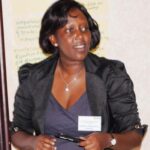
Adeline Muheebwa
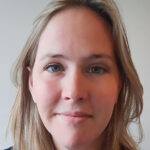
Anne Rietveld
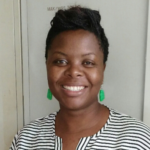
Brenda Boonabaana
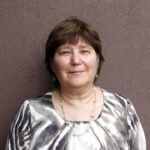
Deborah “Dee” Rubin

Devon Jenkins
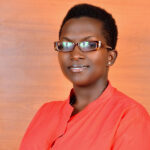
Elizabeth Asiimwe
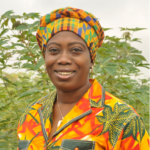
Elizabeth Parkes
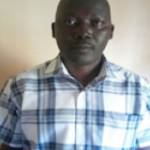
Godfrey Kayobyo

Hale Ann Tufan

Hazel Malapit

Jaron Porciello

Jonathan Ngobi
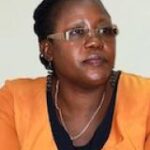
Josephine Ahikire
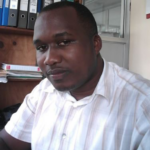
Lawrence Lubyayi
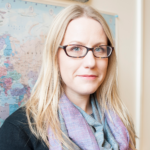
Lora Forsythe

Lori Leonard
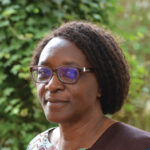
Margaret Mangheni
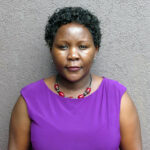
Maria Nassuna-Musoke
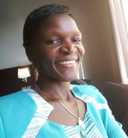
Miriam Kyotalimye

Netsayi Mudege
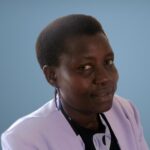
Peace Musiimenta

Peter Kulakow

Renée Bullock

Richard Miiro

Ravin Weerawardena

Sarah Mayanja


